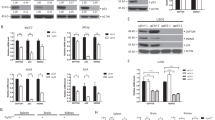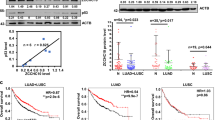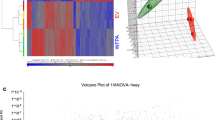Abstract
Mdm2 inhibits the function of the p53 tumor suppressor. Mdm2 is overexpressed in many tumors with wild-type p53 suggesting an alternate mechanism of loss of p53 activity in tumors. An Mdm2-binding protein (MTBP) was identified using a yeast two-hybrid screen. In tissue culture, MTBP inhibits Mdm2 self-ubiquitination, leading to stabilization of Mdm2 and increased degradation of p53. To address the role of MTBP in the regulation of the p53 pathway in vivo, we deleted the Mtbp gene in mice. Homozygous disruption of Mtbp resulted in early embryonic lethality, which was not rescued by loss of p53. Mtbp+/− mice were not tumor prone. When mice were sensitized for tumor development by p53 heterozygosity, we found that the Mtbp+/−p53+/− mice developed significantly more metastatic tumors (18.2%) as compared to p53+/− mice (2.6%). Results of in vitro migration and invasion assays support the in vivo findings. Downmodulation of Mtbp in osteosarcoma cells derived from p53+/− mice resulted in increased invasiveness, and overexpression of Mtbp in Mtbp+/−p53+/− osteosarcoma cells inhibited invasiveness. These results suggest that MTBP is a metastasis suppressor. These results advance our understanding of the cellular roles of MTBP and raise the possibility that MTBP is a novel therapeutic target for metastasis.
This is a preview of subscription content, access via your institution
Access options
Subscribe to this journal
Receive 50 print issues and online access
$259.00 per year
only $5.18 per issue
Buy this article
- Purchase on Springer Link
- Instant access to full article PDF
Prices may be subject to local taxes which are calculated during checkout



Similar content being viewed by others
References
Alt JR, Greiner TC, Cleveland JL, Eischen CM . (2003). Mdm2 haplo-insufficiency profoundly inhibits Myc-induced lymphomagenesis. EMBO J 22: 1442–1450.
Bartek J, Bartkova J, Vojtesek B, Staskova Z, Lukas J, Rejthar A et al. (1991). Aberrant expression of the p53 oncoprotein is a common feature of a wide spectrum of human malignancies. Oncogene 6: 1699–1703.
Bond GL, Hu W, Bond EE, Robins H, Lutzker SG, Arva NC et al. (2004). A single nucleotide polymorphism in the MDM2 promoter attenuates the p53 tumor suppressor pathway and accelerates tumor formation in humans. Cell 119: 591–602.
Boyd MT, Vlatkovic N, Haines DS . (2000). A novel cellular protein (MTBP) binds to MDM2 and induces a G1 arrest that is suppressed by MDM2. J Biol Chem 275: 31883–31890.
Brady M, Vlatkovic N, Boyd MT . (2005). Regulation of p53 and MDM2 activity by MTBP. Mol Cell Biol 25: 545–553.
Che G, Chen J, Liu L, Wang Y, Li L, Qin Y et al. (2006). Transfection of nm23-H1 increased expression of beta-Catenin, E-Cadherin and TIMP-1 and decreased the expression of MMP-2, CD44v6 and VEGF and inhibited the metastatic potential of human non-small cell lung cancer cell line L9981. Neoplasma 53: 530–537.
Donehower LA, Harvey M, Slagle BL, McArthur MJ, Montgomery Jr CA, Butel JS et al. (1992). Mice deficient for p53 are developmentally normal but susceptible to spontaneous tumours. Nature 356: 215–221.
Finch RA, Donoviel DB, Potter D, Shi M, Fan A, Freed DD et al. (2002). mdmx is a negative regulator of p53 activity in vivo. Cancer Res 62: 3221–3225.
Iwakuma T, Lozano G . (2003). MDM2, an introduction. Mol Cancer Res 1: 993–1000.
Iwakuma T, Parant JM, Fasulo M, Zwart E, Jacks T, de Vries A et al. (2004). Mutation at p53 serine 389 does not rescue the embryonic lethality in mdm2 or mdm4 null mice. Oncogene 23: 7644–7650.
Jacks T, Remington L, Williams BO, Schmitt EM, Halachmi S, Bronson RT et al. (1994). Tumor spectrum analysis in p53-mutant mice. Curr Biol 4: 1–7.
Jee BK, Park KM, Surendran S, Lee WK, Han CW, Kim YS et al. (2006). KAI1/CD82 suppresses tumor invasion by MMP9 inactivation via TIMP1 up-regulation in the H1299 human lung carcinoma cell line. Biochem Biophys Res Commun 342: 655–661.
Jones SN, Hancock AR, Vogel H, Donehower LA, Bradley A . (1998). Overexpression of Mdm2 in mice reveals a p53-independent role for Mdm2 in tumorigenesis. Proc Natl Acad Sci USA 95: 15608–15612.
Jones SN, Roe AE, Donehower LA, Bradley A . (1995). Rescue of embryonic lethality in Mdm2-deficient mice by absence of p53. Nature 378: 206–208.
Kamijo T, Zindy F, Roussel MF, Quelle DE, Downing JR, Ashmun RA et al. (1997). Tumor suppression at the mouse INK4a locus mediated by the alternative reading frame product p19ARF. Cell 91: 649–659.
Koc EC, Burkhart W, Blackburn K, Moyer MB, Schlatzer DM, Moseley A et al. (2001). The large subunit of the mammalian mitochondrial ribosome. Analysis of the complement of ribosomal proteins present. J Biol Chem 276: 43958–43969.
Lang GA, Iwakuma T, Suh YA, Liu G, Rao VA, Parant JM et al. (2004). Gain of function of a p53 hot spot mutation in a mouse model of Li–Fraumeni syndrome. Cell 119: 861–872.
Levine AJ . (1993). The tumor suppressor genes. Annu Rev Biochem 62: 623–651.
Levine AJ, Finlay CA, Hinds PW . (2004). P53 is a tumor suppressor gene. Cell 116: S67–S69, 61 p following S69.
Lozano G, Zambetti GP . (2005). What have animal models taught us about the p53 pathway? J Pathol 205: 206–220.
Lundgren K, Montes de Oca Luna R, McNeill YB, Emerick EP, Spencer B, Barfield CR et al. (1997). Targeted expression of MDM2 uncouples S phase from mitosis and inhibits mammary gland development independent of p53. Genes Dev 11: 714–725.
Mendrysa SM, O'Leary KA, McElwee MK, Michalowski J, Eisenman RN, Powell DA et al. (2006). Tumor suppression and normal aging in mice with constitutively high p53 activity. Genes Dev 20: 16–21.
Migliorini D, Lazzerini Denchi E, Danovi D, Jochemsen A, Capillo M, Gobbi A et al. (2002). Mdm4 (Mdmx) regulates p53-induced growth arrest and neuronal cell death during early embryonic mouse development. Mol Cell Biol 22: 5527–5538.
Montes de Oca Luna R, Wagner DS, Lozano G . (1995). Rescue of early embryonic lethality in mdm2-deficient mice by deletion of p53. Nature 378: 203–206.
Olive KP, Tuveson DA, Ruhe ZC, Yin B, Willis NA, Bronson RT et al. (2004). Mutant p53 gain of function in two mouse models of Li–Fraumeni syndrome. Cell 119: 847–860.
Parant J, Chavez-Reyes A, Little NA, Yan W, Reinke V, Jochemsen AG et al. (2001). Rescue of embryonic lethality in Mdm4-null mice by loss of Trp53 suggests a nonoverlapping pathway with MDM2 to regulate p53. Nat Genet 29: 92–95.
Purdie CA, Harrison DJ, Peter A, Dobbie L, White S, Howie SE et al. (1994). Tumour incidence, spectrum and ploidy in mice with a large deletion in the p53 gene. Oncogene 9: 603–609.
Reinke V, Bortner DM, Amelse LL, Lundgren K, Rosenberg MP, Finlay CA et al. (1999). Overproduction of MDM2 in vivo disrupts S phase independent of E2F1. Cell Growth Differ 10: 147–154.
Sharpless NE, DePinho RA . (1999). The INK4A/ARF locus and its two gene products. Curr Opin Genet Dev 9: 22–30.
Sheng S, Truong B, Fredrickson D, Wu R, Pardee AB, Sager R . (1998). Tissue-type plasminogen activator is a target of the tumor suppressor gene maspin. Proc Natl Acad Sci USA 95: 499–504.
Suzuki T, Terasaki M, Takemoto-Hori C, Hanada T, Ueda T, Wada A et al. (2001). Structural compensation for the deficit of rRNA with proteins in the mammalian mitochondrial ribosome. Systematic analysis of protein components of the large ribosomal subunit from mammalian mitochondria. J Biol Chem 276: 21724–21736.
Tsukada T, Tomooka Y, Takai S, Ueda Y, Nishikawa S, Yagi T et al. (1993). Enhanced proliferative potential in culture of cells from p53-deficient mice. Oncogene 8: 3313–3322.
Vogelstein B, Lane D, Levine AJ . (2000). Surfing the p53 network. Nature 408: 307–310.
Weber JD, Taylor LJ, Roussel MF, Sherr CJ, Bar-Sagi D . (1999). Nucleolar Arf sequesters Mdm2 and activates p53. Nat Cell Biol 1: 20–26.
Acknowledgements
This study was supported by an MD Anderson Institutional Research Grant (T Iwakuma), Cancer Center Support Grant (016672), Kadoorie Foundation (G Lozano), an NIH COBRE grant (T Iwakuma) and NCI grant CA098139 (CM Eischen).
Author information
Authors and Affiliations
Corresponding authors
Additional information
Supplementary Information accompanies the paper on the Oncogene website (http://www.nature.com/onc).
Supplementary information
Rights and permissions
About this article
Cite this article
Iwakuma, T., Tochigi, Y., Van Pelt, C. et al. Mtbp haploinsufficiency in mice increases tumor metastasis. Oncogene 27, 1813–1820 (2008). https://doi.org/10.1038/sj.onc.1210827
Received:
Revised:
Accepted:
Published:
Issue Date:
DOI: https://doi.org/10.1038/sj.onc.1210827
Keywords
This article is cited by
-
MTBP phosphorylation controls DNA replication origin firing
Scientific Reports (2021)
-
MTBP inhibits migration and metastasis of hepatocellular carcinoma
Clinical & Experimental Metastasis (2015)
-
MTBP Promotes the Invasion and Metastasis of Hepatocellular Carcinoma by Enhancing the MDM2-Mediated Degradation of E-Cadherin
Digestive Diseases and Sciences (2015)
-
Microenvironmental Influences on Metastasis Suppressor Expression and Function during a Metastatic Cell’s Journey
Cancer Microenvironment (2014)
-
MTBP suppresses cell migration and filopodia formation by inhibiting ACTN4
Oncogene (2013)



